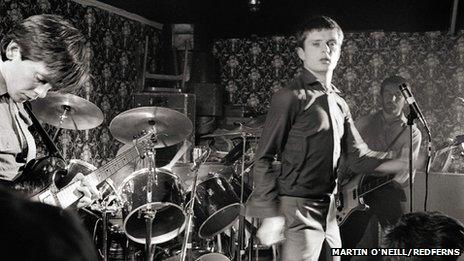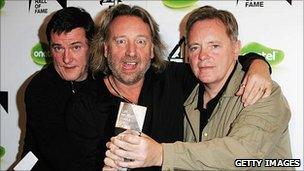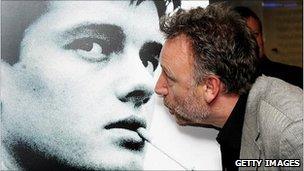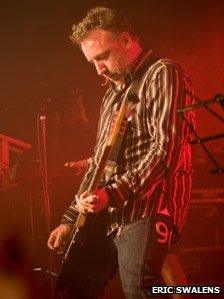Peter Hook's Joy Division regrets
- Published

Joy Division's Ian Curtis (centre), Peter Hook (right) and Bernard Sumner (left)
More than 30 years after the untimely death of Joy Division singer Ian Curtis, the band remain one of the most influential and revered bands in British rock.
Bassist Peter Hook, who went on to form New Order with his remaining bandmates, has now written a book about the Joy Division years.
He discusses the continuing guilt over Curtis's suicide and his current "war" with other band members.
In the book, you say you were inspired to form a band by watching The Sex Pistols in Manchester in 1976. What would you be doing now if you had not been at that gig?
"That is something thankfully I'll never know. The only love I've ever had, apart from music, is cars. So I always imagine that I would have gone to work in a scrap yard."
Has researching and writing the book given you a different perspective on the band?
"The thing that made me feel sad about it was the ongoing fracas with the other members, with what I feel is the wrong use of the New Order name and also the dissatisfaction I feel with the way they've handled the affairs going forward.

New Order, pictured in 2005, split in acrimonious circumstances two years later
"I probably would have looked at it a lot more fondly if I wasn't in court with the other members very shortly.
[Guitarist Bernard Sumner and drummer Stephen Morris are continuing to tour as New Order but Hook is contesting their use of the name and the financial arrangements.]
"To be at war with somebody, especially the way Bernard and I are, and the only way you carry it out is in the press, is a very pathetic schoolboy thing. It's just happened with them in The Guardian, external and me now. It always leaves a bad taste in the mouth."
Didn't writing the book make you think life is too short for squabbles like this?
"It's human nature for you to be gladiatorial, isn't it? I don't want to sit there for the rest of my life thinking what they did was wrong and have to suffer it. I'd rather fight and at least I can say I had a go.
"The last thing I want is their descendants laughing at my descendants in the future. It's an odd situation, but it is about business."
Joy Division were such an important band, but this book is about four mates having a laugh on the road and doing what lads do. Do you think the subsequent mythology has built the band up to be something they were not?

Hook gave his blessing to the film Control, about Ian Curtis's life
"While I was in New Order we completely ignored anything to do with Joy Division. The myth was good: 'They all think we're dead arty and intelligent and intellectual.'
"I'm happy to buy into the myth, so when I came to writing the book I was wary about breaking it. Do people want to know that Ian used to urinate in ashtrays? Do people want to know that Bernard used to eat his dinner in the bath?"
Some might have expected you to use the book as an opportunity to stick the boot into Bernard and the others.
"Strangely enough the others thought that too. It wasn't on my mind.
"There are certain things I think are sacrosanct and you shouldn't underestimate the part that Bernard played in creating Joy Division's sound; you shouldn't underestimate the part that Stephen played in it or Ian or me. We were at our best in that period."
You say you "hated" your debut album Unknown Pleasures after it was recorded. Why?
"As far as Bernard and I were concerned, we were in a punk band. In the studio, [producer] Martin Hannett turned us into a normal group and Bernard and I didn't want that - we wanted to sound like The Sex Pistols.
"I said 'I don't like it' and went and had a huff in the corner. We didn't have the vision to see past that, but he did give it such fantastic production - he gave it timelessness."

Hook now plays Joy Division and New Order material on tour
How has it been looking back at Ian's death, and what you could have done differently?
"When you put it all in a timeline, it was a shock to see how intense the work was around nearly every episode the poor boy had.
"He'd have a really bad fit one night and be at a gig the next day. He was self-harming and was at a gig the next day. The first suicide attempt, he was at a gig the next day. To look at it on paper, I thought, this is ridiculous.
"It still makes me feel guilty and in many ways it explains why the ending came. If we'd have cancelled all the gigs and got him rested and well and got him help, we might not have got the nasty ending that we did. But we'll never know.
"I must admit that Ian didn't want that, Ian didn't want us to stop, and that was the big problem. We were all just glad to hear from him that he was OK and happy to carry on."
What are your memories of Ian in the good times?
"He wasn't a morose chap. He was happy a lot of the time and was very sincerely happy about Joy Division's success and the hard work that we'd put in.
"He struck me as a very generous person to work with. After working with a lot of people over the years, you don't meet many people who have his attitude. I remember him very fondly."
Unknown Pleasures by Peter Hook is published on 1 October. Hook's new band The Light will perform Joy Division material on a UK tour in November and December before playing New Order's first two albums Movement and Power Corruption And Lies in January.
- Published7 June 2011
- Published7 March 2011